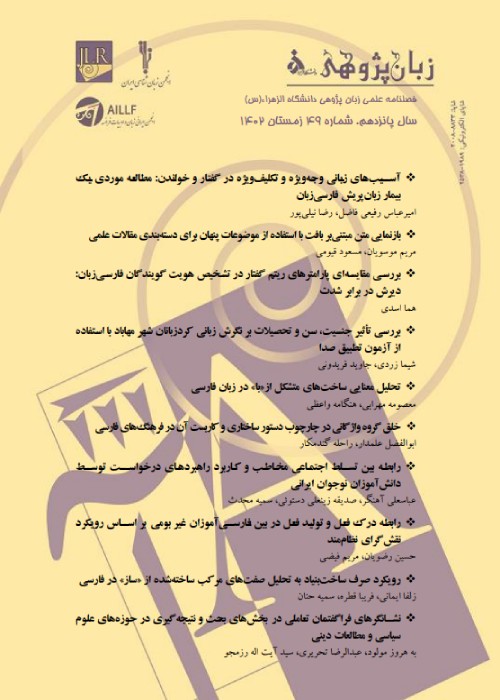Critical Discourse Analysis of Konkoor (University Entrance Exam) Commercials by Preparatory Institutes: The Case of Modaresan Sharif, Parseh, and Mahan Institutes
Author(s):
Article Type:
Research/Original Article (دارای رتبه معتبر)
Abstract:
University Entrance Exams (Konkoor) in Iran have caused severe competitions among educational institutes which prepare candidates for the high-stakes exams. Such institutes, through widespread advertising, attempt to beat their rivals and carve out a niche for themselves. Nonetheless, the discourse of such media advertisements, which contain veiled ideologies and hidden values, has rarely been analyzed critically. Through adopting Critical Discourse Analysis (CDA) model of Fairclough (1992), the present study aims at studying the discourse of nine (9) commercials produced by three (3) renowned institutes (Modarresan-e Sharif, Parseh, Mahan) that prepare candidates for Master's and Doctorate exams. The model contains three interrelated layers of analysis, namely text analysis, processing analysis, and social analysis. Accordingly, at text analysis, we focused on describing the linguistic features of the text (the visual and verbal signs); at processing analysis, we tried to interpret the processes of production and consumption of the texts with reference to their relevant situational and intertextual contexts; and at social level, we explained the effects the texts may have on the individuals. In case of the present study, the analysis of linguistic and non-linguistic structures of the commercials revealed that the institutes deployed various persuasion techniques, including defamiliarization, short and creative slogans (like become Mahani, 1,2,3, Parseh), visual and auditory appeals (use of eye-soothing colors and voices), and anthropomorphism (like Parseh is 18 now or Parseh-like self-confidence). Moreover, they mention a wide variety of services offered by the institutes (like online and face-to-face courses, compact books, periodical standardized tests, or expert counseling). Using testimonials by previous successful candidates who aced the test and offering discounts or special precious services for a limited amount of time (scarcity technique) were among other observed persuasion techniques. Through such techniques they keep instilling senses of needs and dependency into the candidates’ minds. Critically looking, it seems that channelizing learners’ dreams is at the heart of such advertisements. In other words, gaining admission to university or getting an A on the exam is shown as the only dream (or one of the few available dreams) every individual should aspire to reach. Analogies could also be drawn between this view and the conception of “iron cage” proposed by the German sociologists, Max Weber. He believed that as a result of increase in rationalization in modernized social life, people and societies’ free actions have become more and more limited; as if they were being born and kept in an “iron cage” out of which they could not dream. Still more, re-producing or normalizing fast-food view of knowledge, a worldview which is in marked contrast with the sublime nature of knowledge, could be seen to be a deep-rooted ideology underlying the advertisements. This bears so much resemblance to George Ritzer’s (1993) concept of McDonalization. In his famous book, McDonaldization of Society, he argues that modern institutes enjoy characteristics of efficiency, calculability, predictability, or standardization, and control that are chiefly found in McDonald fast-food chains. Similarly, the preparatory institutes for University Entrance Exams through offering several online and face-to-face services like free consultations, running courses in various branches all around the country, and offering discourses for special events, among others, attempt to absorb more and more customers and hence reap more financial benefits. In other words, "marketization of higher education" is vividly seen in the discourse of such preparatory institutes. Meanwhile, through designing compact pedagogic materials, specialized books and packaged sets, and administrating periodical standardized multiple-choice mock tests that greatly resemble the original test, the institutes attempt to minimize the amount of time required for the test preparation as efficiently as possible. In other words, the candidates (learners) play the role of consumers who are supposed to digest large amounts of food in a short period of time through memorizing transmitted information and learning test-taking strategies. Such top-down, transmission and memorization-based model of education has long been criticized by critical researchers who have expressed their concerns about the inefficiency of the current educational system in bringing up critical learners and, in fact, future citizens who are able to apply their education in their daily lives (Fairclough, 2003, 2018; Freire, 1970). They argue that what happens every day in our classrooms both shapes and is shaped by the larger social currents that define who we are as a society and where we are headed to. Such commercials by the preparatory institutes, without a shadow of a doubt, keep legitimizing the status quo system of education in Iran. While transforming the current system of education seems to be a tall order, though not impossible, enhancing media literacy of the consumers (here university candidates) could aid them make informed decisions.
Keywords:
Language:
Persian
Published:
Language research, Volume:13 Issue: 38, 2021
Pages:
301 to 326
magiran.com/p2262133
دانلود و مطالعه متن این مقاله با یکی از روشهای زیر امکان پذیر است:
اشتراک شخصی
با عضویت و پرداخت آنلاین حق اشتراک یکساله به مبلغ 1,390,000ريال میتوانید 70 عنوان مطلب دانلود کنید!
اشتراک سازمانی
به کتابخانه دانشگاه یا محل کار خود پیشنهاد کنید تا اشتراک سازمانی این پایگاه را برای دسترسی نامحدود همه کاربران به متن مطالب تهیه نمایند!
توجه!
- حق عضویت دریافتی صرف حمایت از نشریات عضو و نگهداری، تکمیل و توسعه مگیران میشود.
- پرداخت حق اشتراک و دانلود مقالات اجازه بازنشر آن در سایر رسانههای چاپی و دیجیتال را به کاربر نمیدهد.
In order to view content subscription is required
Personal subscription
Subscribe magiran.com for 70 € euros via PayPal and download 70 articles during a year.
Organization subscription
Please contact us to subscribe your university or library for unlimited access!


